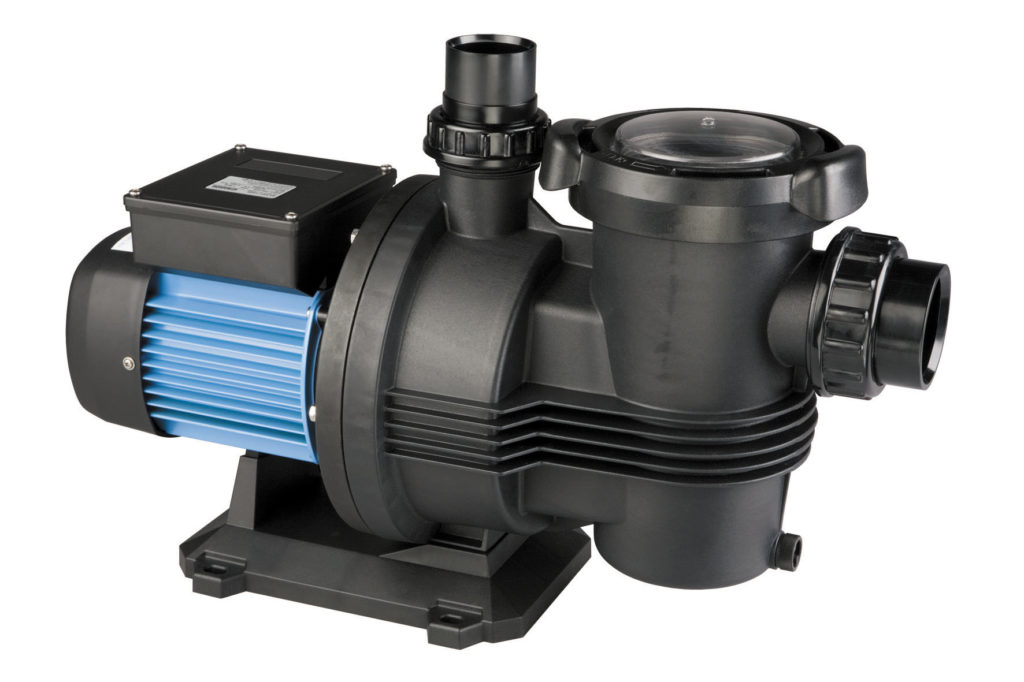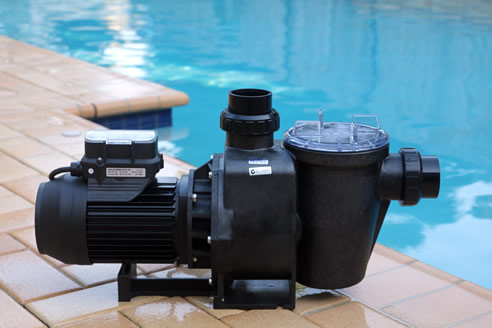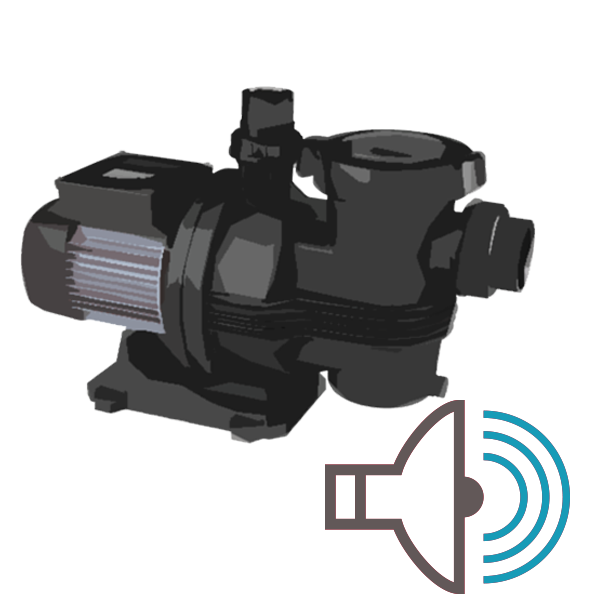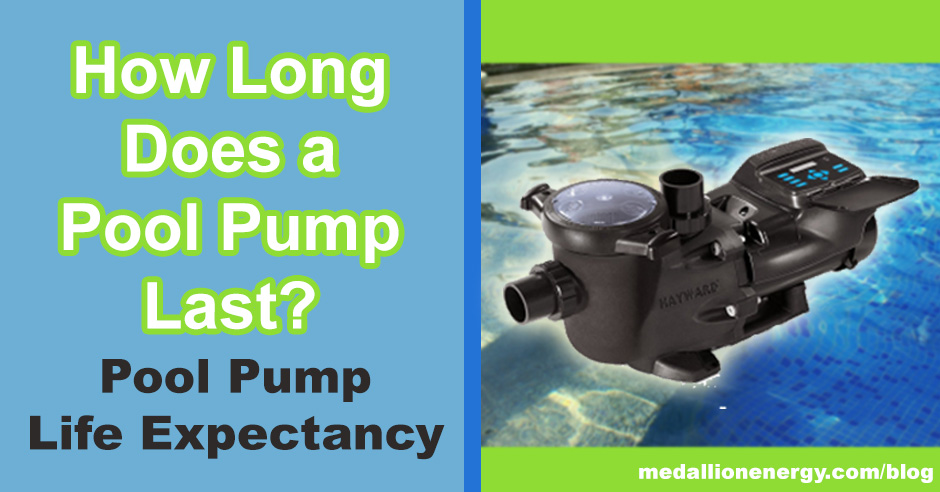Want to know how long a pool pump lasts? Wondering when you should replace you pump or motor?
Find out in this post



How long does a pool pump last?
With regular use, most pool pumps last 8 to 12 years before needing replacement. That said, there are a few factors that affect how long a pump lasts.
What affects a pool pump’s life expectancy?
Everything from the size of the pump to the amount of use affects how long it’ll last.
Size
When a pump is too small for a pool, it struggles to move water and overworks itself at least 50% of the time. And oftentimes, an undersized pump needs to run much longer than normal to compensate.
This type of usage drastically reduces the pump’s lifespan.
For small to average sized pools, a 1.5 hp (or greater) pump is a safe bet. Overall, the stronger the pump, the better.
Usage & Maintenance
How often you run your pump has a direct effect on its lifespan.
Simply put: the more you use your pump, the more wear it experiences
But at the same time, the type of pump you use plays a role too.
Most pool owners use one of two types of pool pumps: single speed and variable speed.
While single speed pumps are cheaper initially, their biggest flaw lies right in their name. They can only run at a single speed.
This means constant, high energy use whether you actually need all that pumping power or not.
Variable speed pool pumps, on the other hand, offer a range of speeds. Each speed is ideal for certain situations, from casually running your filter through the night, to quickly clearing out the green from an algae infested pool.
And since these pumps can switch between slow and fast speeds, they’re way more energy efficient than their single-speed counterparts.
Related: Why You Should Use a Variable Speed Pool Pump
Why pool pump maintenance is your best friend
Throughout a pool pump’s lifetime, small parts like screws, sealants, and O-rings will break down and need replacement. When this natural aging occurs, the faster you respond to it, the better.
This is why maintenance is the best way to save your money and keep your pump working.
Inspect the condition of your pump a few times a year to keep it in good working condition. Look for:
- Missing screws
- Cracks in the plastic housing
- Worn down or broken O-rings
- Worn down sealant
Most pool owners, unfortunately, forget about the pump sitting in the background.
And who can blame them? Aside from emptying the basket, you hardly ever have to deal with it.
But for pool owners who want to get the most out of their pool pumps, checking them regularly and handling small repairs as they come along is the best method.
It’s cheaper than replacing the pump, and it saves you the stress of troubleshooting in 100-degree summer weather.
And during the winter, it’s important to properly winterize your swimming pool pump to avoid freeze damage.
That said, there eventually comes a point when replacement makes more sense than a repair.



When to replace your pool pump | How to tell if pool pump is bad
Although some pool pumps can be maintained for years beyond their expected lifespan, there eventually comes a point when replacement is the only sensible option.
Here are a few signs that your pump needs replacement:
- When the housing of the pump is cracked or breaking down
- A pump’s housing/casing being worn down is like deep rust on the body on a car. Chances are if the outer layer of the pump is breaking down, several other parts are soon to follow.
- Next to the pump motor, replacing the housing is the most expensive repair.
- When parts are outdated or discontinued
- If you own a pump and struggle to find most of the parts that you need, it’s time for a new pump.
- Don’t pour money into an outdated pump just to find out the part you need no longer exists.
- Pump is older than 12 years
- Maintaining a pump beyond this point isn’t worth the effort. You spend too much in repairs.
- There are more energy efficient pumps that will save you money instead
- If the pump is made of bronze or cast iron
- No one manufactures these kinds of pumps anymore, high-grade PVC plastic is the standard. It’s cheaper, and it’s the build material that 99% of pool pump manufacturers use.
Related: How To Troubleshoot Your Pool Pump
How long does a pump motor last?
Most pool pump motors last at least 6-8 years, often longer. But that’s if you’re referring to magnetic drive pool motors, which are used in newer variable speed pumps.
These motors create less friction and offer higher energy efficiency compared to their older counterparts, copper winding motors.
Copper winding motors aren’t as energy efficient or well-designed as magnetic drive motors. They only last about half as long for that very reason (3 years). So although they are a little cheaper, the savings is hardly worth it in the long run.
That said, regardless of which pump motor you have, it’s important to know when replacement is the best choice.
When to replace a pump motor



Overall, there are two red flags to look out for: sound and silence.
With that in mind, here are a few signs that your pool pump motor needs replacement:
- Grind or screeching noises
- The motor’s bearings are getting worn down — usually caused by internal water leaks or flooding
- Humming sound
- Defective capacitor (used to store electrical energy) in the pump, due to a power surge or overheating
- Clicking
- The motor is tripping the breaker and experiencing an internal electrical problem
- Silence/no sounds
- If the motor is receiving adequate power from the breaker, but still not responding, then it’s likely failed
Type of pool pumps
There are three types of pool pumps:
Single speed pumps, dual speed pumps, and variable speed pumps.
With multiple speed settings and superior energy efficiency, it’s variable speed pumps that are most popular these days.
At this point, most single speed pumps are being phased out due to their limited functionality. Plus, one constant speed isn’t always a good thing when you want to save energy.
Dual speed pumps are a good for pool owners who aren’t quite ready to upgrade to a variable speed pump but want more than what a single speed can offer.
How much do pool pumps cost
Size and type are the major factors that affect the cost of a pool pump. Here’s what pricing tends to look like for each:
Single speed pump | Cost: $150 – $500
Dual speed pump | Cost: $400 – $800
Variable speed pump | Cost: $700 – $1700
Closing Thoughts
After reading this post, it should be easier to decide whether or not it’s time to replace your pump. The tell-tale signs that a pump needs replacement are exactly what you would expect: loud noises, age, and malfunction. But sometimes, a pump just needs a little bit of troubleshooting to fix minor problems. You can learn more about pool pump troubleshooting in this post.
If you found this post helpful, then you might also like:


